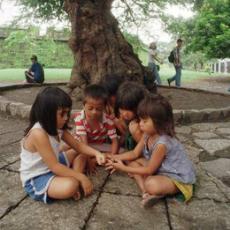This is the VOA Special English Health Report.
A new study suggests that early exposure to germs strengthens the immune system. That means letting children get a little dirty might be good for their health later in life.
The study involved laboratory mice. It found that adult mice raised in a germ-free environment were more likely to develop allergies, asthma and other autoimmune disorders. There are more than 80 disorders where cells that normally defend the body instead attack tissues and organs.
They include rheumatoid arthritis, which attacks the joints; Crohn's disease, an inflammatory bowel condition; and juvenile diabetes. Hay fever, a common allergy, is also an autoimmune disorder.

Richard Blumberg is a professor at Harvard Medical School in Boston, Massachusetts. He says in 1989, medical researchers sought to explain these diseases with what they called the "hygiene hypothesis." They proposed that the increasing use of antibacterial soaps and other products, especially early in life, could weaken immune systems.
RICHARD BLUMBERG: "The hypothesis has stated or suggested that early-life exposure to microbes is a very important determinant of later life sensitivity to allergic and so-called autoimmune diseases, such as hay fever, asthma, inflammatory bowel disease and others."
Now, Dr. Blumberg and a team have what they say is the first biological evidence to link early exposure to germs to stronger adult immune systems. They say this exposure could prevent the development of some autoimmune diseases.
In the adult germ-free mice, they found that inflammation in the lungs and colon was caused by so-called killer T cells. These normally fight infection. But they became overactive and targeted healthy tissue -- an autoimmune condition seen in asthma and a disease called ulcerative colitis.
Dr. Blumberg says the mice raised in a normal environment did not have the same reaction. He says their immune systems had been "educated" by early exposure to germs.
Rates of autoimmune disorders are rising worldwide, but mostly in wealthier, industrialized countries.
RICHARD BLUMBERG: "I think one obvious question, for example, that's raised by these studies is the early life use of antibiotics and whether we need to be more careful in their prescribing."
Rob Dunn is a professor of ecology and evolutionary biology at North Carolina State University in Raleigh. He says the new study does not mean people should stop washing.
ROB DUNN: "Wash your hands, but don't do it with antimicrobial soap. Let your kids play in a reasonable amount of dirt and get outside and get exposed to a diversity of things."
The study appears in the journal Science.
And that's the VOA Special English Health Report. I'm Steve Ember.
autoimmune disorder: 自身免疫疾病
rheumatoid arthritis: 風(fēng)濕性關(guān)節(jié)炎
Crohn's disease: 節(jié)段性回腸炎
Hay fever: 花粉病
ulcerative colitis: 潰瘍性結(jié)腸炎
Rising temperatures, rising health problems
In rural India, medical myths spread
New York city battles childhood obesity
When a cut finger is more serious than it might seem
(來源:VOA 編輯:旭燕)
